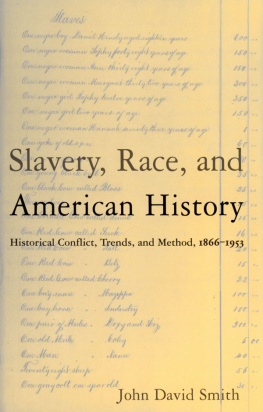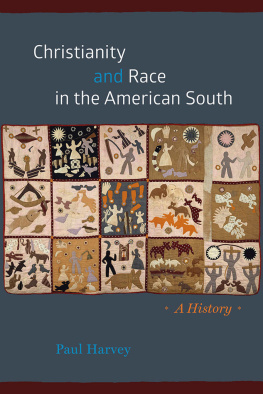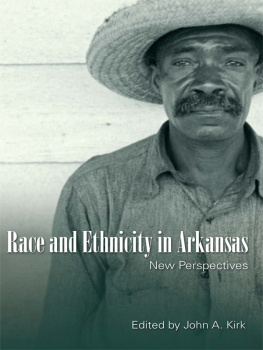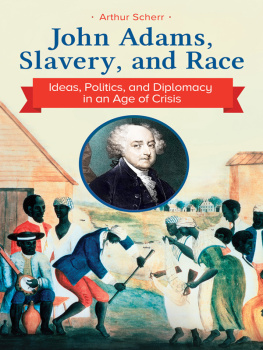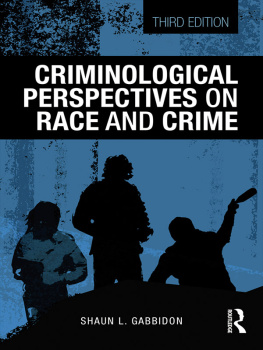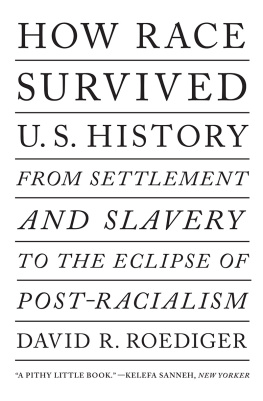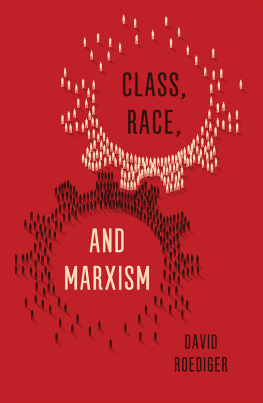Slavery, Race,
and
American History
First published 1999 by M.E. Sharpe
Published 2015 by Routledge
2 Park Square, Milton Park, Abingdon, Oxon OX14 4RN
711 Third Avenue, New York, NY 10017, USA
Routledge is an imprint of the Taylor & Francis Group, an informa business
Copyright 1999 Taylor & Francis. All rights reserved.
No part of this book may be reprinted or reproduced or utilised in any form or by any electronic, mechanical, or other means, now known or hereafter invented, including photocopying and recording, or in any information storage or retrieval system, without permission in writing from the publishers.
Notices
No responsibility is assumed by the publisher for any injury and/or damage to persons or property as a matter of products liability, negligence or otherwise, or from any use of operation of any methods, products, instructions or ideas contained in the material herein.
Practitioners and researchers must always rely on their own experience and knowledge in evaluating and using any information, methods, compounds, or experiments described herein. In using such information or methods they should be mindful of their own safety and the safety of others, including parties for whom they have a professional responsibility.
Product or corporate names may be trademarks or registered trademarks, and are used only for identification and explanation without intent to infringe.
Library of Congress Cataloging-in-Publication Data
Smith, John David, 1949
Slavery, race, and American history : historical conflict, trends,
and method, 18661953 / John David Smith.
p. cm.
Includes bibliographical references and index.
ISBN 0-7656-0377-2 (hardcover : alk, paper) ISBN 0-7656-0378-0 (pbk. :alk. paper)
1. SlaveryUnited StatesHistoriography. 2. Afro-AmericansHistoriography. 3. RacismUnited StatesHistoriography. 4. United StatesRace relationsHistoriography. 5. HistoriansUnited StatesHistory. I. Title.
E441.S6555 1999
305.896073dc21 98-41941
CIP
ISBN 13: 9780765603784 (pbk)
ISBN 13: 9780765603777 (hbk)
For Holman Hamilton, whom I never had a chance to thank
This book examines the first generations of historians who studied African American slavery and race and analyzes their importance in establishing those topics as major interpretive questions for modem scholars. The early historiography of slavery, race, and the American South provides a useful window to view conflicts between historians, to highlight interpretive trends, and to chart methodological advances among historians of the South in the century following Appomattox. Though early scholars such as James Ford Rhodes and Ulrich Bonnell Phillips, respectively, revived elements of the old neoabolitionist and proslavery arguments, they nevertheless raised many new and important questions about the history of race relations in America. Their interpretations in tum influenced a cadre of later scholars and, in the case of Phillips, led to a Phillips school of state studies on slavery that dominated the historiography of slavery until the early 1950s.
In those years, a broad range of other historians, including George H. Moore, Frederic Bancroft, W.E.B. Du Bois, and Clement Eaton, challenged traditional interpretations and suggested new avenues of inquiry. Central to this book is my belief that contemporary scholars tend to pay insufficient attention to the contributions of their intellectual forebears, especially those with whom they disagree ideologically or in terms of research method. As the essays in this book suggest, however, early historians of slavery and race overcame many obstacles and contributed much to our understanding of these topics. They not only prefigured later scholarship but also reached conclusions of lasting significance, unearthed primary sources, and constructed methodologies adopted by scores of later historians. Significantly, the postCivil War decades witnessed the professionalization of the historians craft in the United States, the rise of rigid racial segregation in the South, and the first serious challenges to the system of American apartheid by blacks. The essays that comprise this book frame the early scholarship on slavery and race within that intellectual and social context.
Long before the modern civil rights era, slavery and race emerged as major topics of concern for American historians. Not surprisingly, historians disagreed openly and engaged regularly in vituperative public debates over such issues as the institutional origins of slavery, the extent of Africanisms within the African American population, the nature of slave life, the domestic slave trade, varieties of slave resistance, slaverys profitability, and plantation paternalism. The essays contained in focus on controversies among historians on these and other issues. Though I emphasize the power of race, class, and sectionalism on the various historians I discuss, students no doubt will recognize the highly personal nature of much of the criticism leveled by historians against their peers. Historians of an earlier day, like historians today, were human beings whose historical criticism sometimes masked intensely personal issues as well as professional ones.
The Georgia-born historian Ulrich Bonnell Phillips led historians of African American slavery during the first half of the new century and, as a result, he is the central figure in this book. Debates over Phillipss scholarship and the importance of his work are the subject of . Phillipss scientific historical training, his belief in black inferiority, his condescension toward working-class people in general, and his identification with slaveholders equipped him well to dominate the historiography of slavery during the age of segregation. In many pathbreaking essays and, especially, in his two landmark booksAmerican Negro Slavery: A Survey of the Supply, Employment and Control of Negro Labor as Determined by the Plantation Rgime (1918) and Life and Labor in the Old South (1929)Phillips analyzed slaverys social and economic history in more depth and with more sophistication than any previous investigator.
His innovative use of primary sources, his analysis of slavery on a cost basis, and his belief that a complex system of paternalism characterized master-slave relations marked Phillipss writings as perceptive and unique. In keeping with the racial thought and scientific historical method of the Progressive era, Phillips described slavery as a benevolent school that educated savage blacks in the ways of civilization. Convinced that slavery largely was good for blacks but bad for whites, he concluded that the peculiar institution was generally an unprofitable form of investment, less a business than a life, one that made fewer fortunes than it made men..
of this book.
Though Phillipss prosouthern, proslavery interpretation continued to dominate slavery scholarship long after his premature death in 1934, as early as 1913, a host of criticsled by W.E.B. Du Bois, Carter G. Woodson, and Frederic Bancroftidentified serious weaknesses in his historical method and condemned his blatantly antiblack interpretations. Significantly, criticisms of Phillips and his scholarship mirrored challenges by blacks and whites to the Jim Crow system of race relations that Phillips and his white disciples represented and endorsed. The stinging postWorld War II denunciations of Phillips by Richard Hofstadter and Kenneth M. Stampp in fact signaled a new history of slavery as surely as the 1954 Brown v. Board of Education case marked the beginning of segregations demise. I have chosen to include Clement Eatons valuable southern travel narratives in this book (see ) as a counterpoint to Phillips. Eaton epitomized the liberal southern white scholar of the 1930s, 1940s, and 1950s and remains an important transitionary figure in the historiography of the South. Though largely ignored today, Eatons significant scholarly contributionsranging from insightful analyses of the freedom of thought struggle in the Old South to its cultural historyawait thorough analysis.

